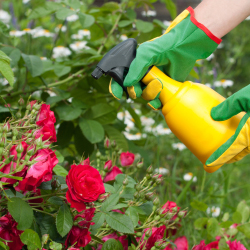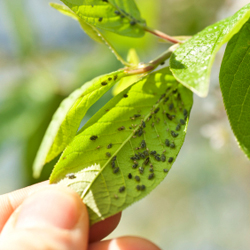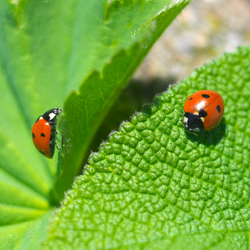One of the most common insects, and one of the most potentially plant-threatening, is the aphid. There are actually many types of aphids – more than 4,000 in all. Some feed on specific plants and others are not so choosy. They all attack the newer plant growth and suck sap from a plant’s internal circulation system, the phloem, in stems and leaves. This can decrease the plant’s growth rate, discolor or disfigure leaves, cause galls to form and transmit plant diseases. Strong aphid infestations can lower produce yields and eventually kill plants altogether.
Recognizing Aphids
Aphids – also called plant lice, blackflies and greenflies – are easy to recognize. They’re about one-eighth to one-third of an inch long, usually pale green but can be almost colorless, pink, black or brown. Their pear-shaped bodies have six legs, small tail-like structures and long, jointed antennae. Aphids are soft-bodied and are mainly found in dense groups on the underside of new plant growth, where they leave behind a sticky residue called honeydew. Ants are attracted to aphid honeydew, so a nearby ant infestation or very active ant colonies may also indicate that aphids are present. Aphids are most common in spring, and die off rapidly in the hot temperatures of summer.
Controlling Aphids
Fortunately, controlling aphids is fairly easy. Most full-spectrum chemical insecticides kill aphids. Other, less strenuous products include plant extracts, neem oil, plant oils and insecticidal soap water sprays. A regular spraying with strong blasts of water or hand picking will control many infestations, especially when just a few aphids have been noticed. Many gardeners release ladybugs (lady beetles) to eat the aphids or parasitic wasps to lay their eggs in the aphid, but because these natural predators will quickly spread out, large applications of hundreds of predators may be needed to effectively control an aphid infestation. Another option is to encourage insect-eating birds to visit the yard – chickadees, titmice and warblers all especially love aphids and can provide superior natural pest control. Even hummingbirds will happily munch on aphids.
It’s best to control aphids early. As their numbers increase, the drying leaves begin to roll over them, thus protecting the aphids from controls such as soaps, oil and water sprays, and making it harder to effectively eliminate these pests. If you think you have aphids or you’re not sure what you have, bring in a sample. We’ll take a look and suggest the best way to eliminate the problem and help you protect your plants.



